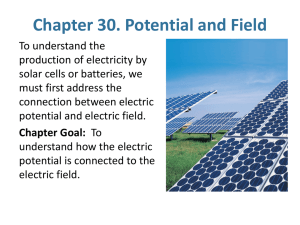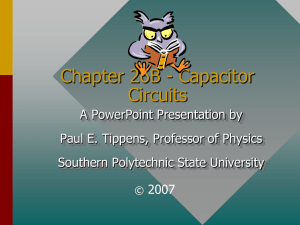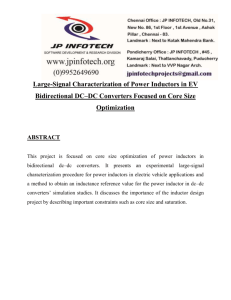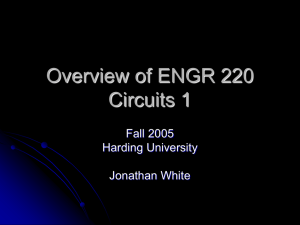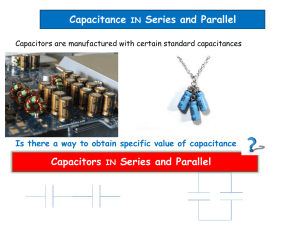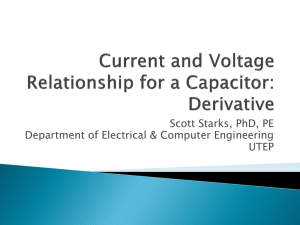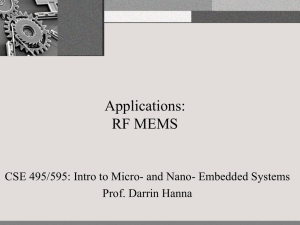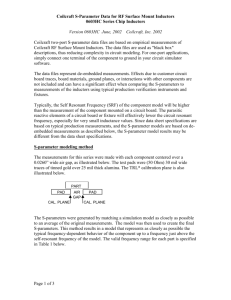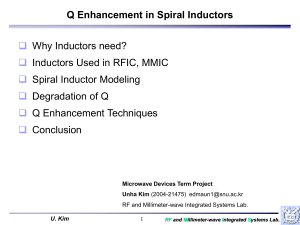capacitor
advertisement
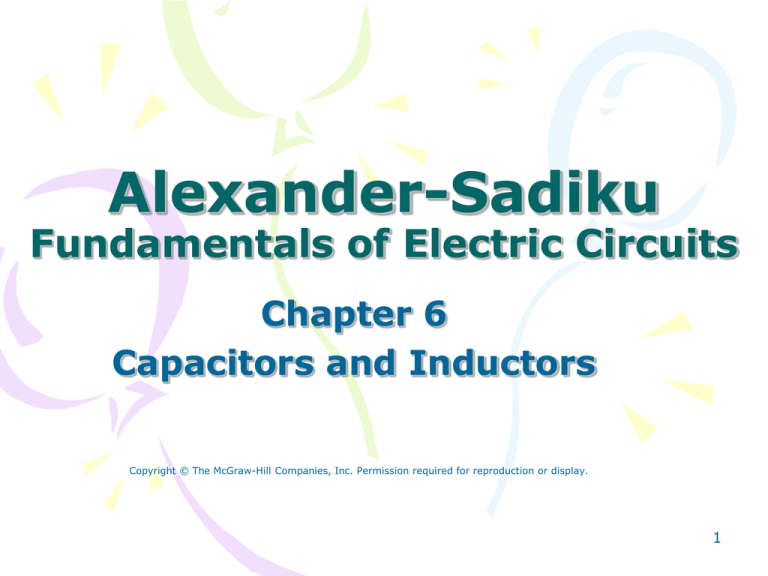
Alexander-Sadiku Fundamentals of Electric Circuits Chapter 6 Capacitors and Inductors Copyright © The McGraw-Hill Companies, Inc. Permission required for reproduction or display. 1 Capacitors and Inductors Chapter 6 6.1 6.2 6.3 6.4 Capacitors Series and Parallel Capacitors Inductors Series and Parallel Inductors 2 6.1 Capacitors (1) • A capacitor is a passive element designed to store energy in its electric field. • A capacitor consists of two conducting plates separated by an insulator (or dielectric). 3 6.1 Capacitors (2) • Capacitance C is the ratio of the charge q on one plate of a capacitor to the voltage difference v between the two plates, measured in farads (F). q C v and C A d • Where is the permittivity of the dielectric material between the plates, A is the surface area of each plate, d is the distance between the plates. • Unit: F, pF (10–12), nF (10–9), and F (10–6) 4 6.1 Capacitors (3) • If i is flowing into the +ve terminal of C – Charging => i is +ve – Discharging => i is –ve • The current-voltage relationship of capacitor according to above convention is iC d v d t and v 1 C t t0 i d t v (t 0 ) 5 6.1 Capacitors (4) • The energy, w, stored in the capacitor is w 1 C v 2 2 • A capacitor is – an open circuit to dc (dv/dt = 0). – its voltage cannot change abruptly. 6 6.1 Capacitors (5) Example 1 The current through a 100-F capacitor is i(t) = 50 sin(120 t) mA. Calculate the voltage across it at t =1 ms and t = 5 ms. Take v(0) =0. Answer: v(1ms) = 93.14mV v(5ms) = 1.7361V 7 6.1 Capacitors (6) Example 2 An initially uncharged 1-mF capacitor has the current shown below across it. Calculate the voltage across it at t = 2 ms and t = 5 ms. Answer: v(2ms) = 100 mV v(5ms) = 500 mV 8 6.2 Series and Parallel Capacitors (1) • The equivalent capacitance of N parallelconnected capacitors is the sum of the individual capacitances. C eq C 1 C 2 ... C N 9 6.2 Series and Parallel Capacitors (2) • The equivalent capacitance of N series-connected capacitors is the reciprocal of the sum of the reciprocals of the individual capacitances. 1 C eq 1 C1 1 C2 ... 1 CN 10 6.2 Series and Parallel Capacitors (3) Example 3 Find the equivalent capacitance seen at the terminals of the circuit in the circuit shown below: Answer: Ceq = 40F 11 6.2 Series and Parallel Capacitors (4) Example 4 Find the voltage across each of the capacitors in the circuit shown below: Answer: v1 = 30V v2 = 30V v3 = 10V v4 = 20V 12 6.3 Inductors (1) • An inductor is a passive element designed to store energy in its magnetic field. • An inductor consists of a coil of conducting wire. 13 6.3 Inductors (2) • Inductance is the property whereby an inductor exhibits opposition to the change of current flowing through it, measured in henrys (H). v L d i d t and L N 2 A l • The unit of inductors is Henry (H), mH (10–3) and H (10–6). 14 6.3 Inductors (3) • The current-voltage relationship of an inductor: i 1 L t t0 v (t ) d t i(t0 ) • The power stored by an inductor: w 1 Li 2 2 • An inductor acts like a short circuit to dc (di/dt = 0) and its current cannot change abruptly. 15 6.3 Inductors (4) Example 5 The terminal voltage of a 2-H inductor is v = 10(1-t) V Find the current flowing through it at t = 4 s and the energy stored in it within 0 < t < 4 s. Answer: Assume i(0) = 2 A. i(4s) = -18V w(4s) = 320J 16 6.3 Inductors (5) Example 6 Determine vc, iL, and the energy stored in the capacitor and inductor in the circuit of circuit shown below under dc conditions. Answer: iL = 3A vC = 3V wL = 1.125J wC = 9J 17 6.4 Series and Parallel Inductors (1) • The equivalent inductance of series-connected inductors is the sum of the individual inductances. L eq L1 L 2 ... L N 18 6.4 Series and Parallel Inductors (2) • The equivalent capacitance of parallel inductors is the reciprocal of the sum of the reciprocals of the individual inductances. 1 L eq 1 L1 1 L2 ... 1 LN 19 6.4 Series and Parallel Capacitors (3) Example 7 Calculate the equivalent inductance for the inductive ladder network in the circuit shown below: Answer: Leq = 25mH 20 6.4 Series and Parallel Capacitors (4) • Current and voltage relationship for R, L, C + + + 21



